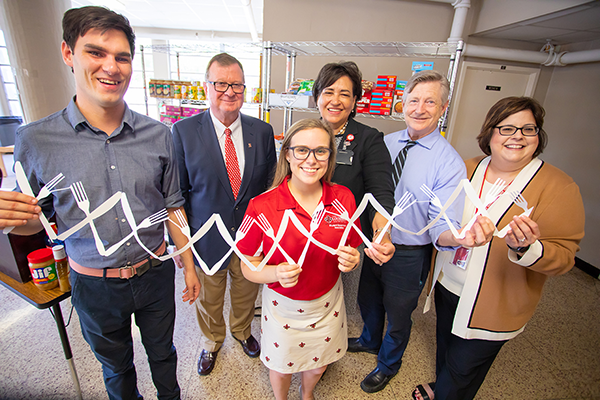An on-campus pantry that aims to enhance food security among University of Louisiana at Lafayette students will open Tuesday.
The Campus Cupboard is a resource for undergraduate and graduate students who require short-term assistance meeting their food needs. It is in UL Lafayette’s Intensive English Program building, 413 Brook Ave.
Inside, a series of sturdy, chrome-plated steel shelves line two storage rooms. They are filled with canned goods and other nonperishables, the results of campus food drives, and donations from individuals, and student and community organizations.
Campus Cupboard is “designed to help tide students over when they are having problems paying for food,” said Dr. Pearson Cross, associate dean of the College of Liberal Arts. He chairs the committee that began planning the pantry late last year.
The panel includes representatives from the Student Government Association, Graduate School, the Division of Student Affairs, the Community Service and Sustainability offices, and other administrative units and academic departments.
The Cupboard’s community partners are Second Harvest Food Bank, the Church of Jesus Christ of Latter Day Saints, Sodexo and United Way of Acadiana.
Cross said next week’s opening will serve as a “soft launch.” The Cupboard will be accessible from 2-5 p.m. on Tuesdays and from 9 a.m. to noon on Fridays for the remainder of the fall semester; winter break hours will be announced later. Pantry patrons will be asked to present student IDs.
The twice-weekly hours of operation this semester will enable organizers to determine demand. Initially, only dry food will be available. Cross said long-term plans include offering fresh and frozen food options, but that requires appliances the Cupboard doesn’t yet have.
“At the outset, we hope to provide five or six items per person that will make it easier for them to get through a day or two. This might be a jar of peanut butter, some power bars, some pasta or sauce, or other items that don’t require extensive cooking,” Cross said.
“Campus Cupboard is not designed to feed someone who has no other food source. In the case of chronic need, we hope to refer students to other providers,” such as Second Harvest or Foodnet, Cross said.
The U.S. Department of Agriculture estimates one in six households in Louisiana experience food insecurity at some point during a year. That means one or more family members reduce the amount they eat or don’t eat at all.
Nationally, one in eight Americans struggles with hunger, and college students aren’t immune. A 2016 national report indicated about 22 percent go hungry at some point in the semester.
Hunger is often situational, and can occur when students have exhausted monthly meal plan allotments, or if they haven’t budgeted money carefully, said Dr. Margarita Perez, UL Lafayette dean of students.
“Statistically, with more than 19,300 students, we know we have individuals who have wondered where their next meals are coming from, or have had to make a choice between eating and other needs,” she said.
“Once we identified even the possibility that this problem existed here, how could we not do something to make it better?”
More than 500 universities and colleges in the United States offer food assistance to students, said Chandler Harris, president of the UL Lafayette’s Student Government Association.
In Louisiana, LSU, Delgado Community College, and Louisiana Tech, Southeastern Louisiana and Northwestern State universities have food pantries.
“Hunger exists on many college campuses, though you can’t always see it. Unfortunately, there is a stigma associated with food insecurity, and that’s unfair,” Harris said.
“The Campus Cupboard is a statement. The University community is saying it wants to help.”
National studies indicate students who face food insecurity are more likely to skip, fall behind in or drop courses, said Dr. Mary Farmer-Kaiser, dean of the University’s Graduate School.
“Food insecurity among undergraduates and graduate students hurts their academic performances. It’s difficult to focus on classwork, complete assignments, or write a thesis or dissertation if you are hungry,” Farmer-Kaiser said.
“The Campus Cupboard is combatting hunger, but it’s also providing an essential tool for student success. No one should have to defer the pursuit of a degree because of hunger.”
For information on the Campus Cupboard, or to donate, email Pearson Cross or Sally Donlon, assistant dean of the College of Liberal Arts. More details are available on Facebook and on the Cupboard website.
Photo caption: Graduate student Trey Delcambre organizes canned food donated to UL Lafayette’s Campus Cupboard. The on-campus pantry opens Tuesday in the University’s Intensive English Program building, 413 Brook Ave. (Photo credit: Doug Dugas / University of Louisiana at Lafayette)
